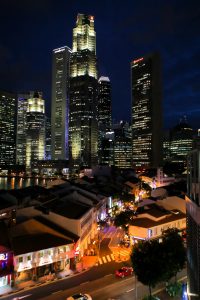Survival by Technopreneurialism: Innovation, Imaginaries and the New Narrative of Nationhood in Singapore
August 17, 2021

In ‘Survival by Technopreneurialism: Innovation, Imaginaries and the New Narrative of Nationhood in Singapore’, Assistant Professor Emily Chua (NUS Department of Sociology) writes about the consequencesof the Singapore government’s efforts to promote innovation to citizens – specifically, the new career expectations placed on them to strive towards technopreneurship. Innovation is a relatively new dimension considered in the Singaporean narrative of national survival. The dominant narrative remains largely that Singapore is a nation that has survived on the willingness and ability of its citizens to make their country’s economy attractive to foreign capital. However, with the advent of innovation, rather than collective prosperity and progress, new notions of individual and financial risk and reward are promoted instead.
Since the early 2000s, government organisations in Singapore have sought to push Singaporeans into the path of entrepreneurship, rather than the ‘traditional’ stable nine-to-five job by stressing the importance of technologically innovative entrepreneurship to individual citizens as well as the nation’s economic survival. A ‘technopreneur’ refers to founders of digital technology-based startups, which are typically viewed to be ‘relevant’ and competitive careers in the future global economy due to the ‘disruptive’ industrial, commercial, and financial innovation necessary to run them. Technopreneurship is framed as the new kind of work that Singapore’s citizens must engage in to maintain or extend their country’s economic success into the technologically more advanced, innovative, and disruption-laden future that awaits. This phenomenon is not unique to Singapore, but undertaken by many other national governments around the world, and celebrated in events such as World Entrepreneurs’ Day held on the 21st of August every year.
Dr Chua explains how national investments in innovations do not only impact research and development activities, but can also impact the social and political life of citizens if their idea of what nationhood entails is altered. Research and development in science and technology both influence and are influenced by the imaginaries of the communities they pertain to. The array of government-led policies, programmes, grants, and discourses promoting technopreneurship constitute elements of a national sociotechnical imaginary. Dr Chua analyses the figure of the technopreneur in Singapore as a newly emergent sociotechnical imaginary and argues that it changes the established mode of ‘emplotment’, which refers to a way of organizing facts to provide structure to a story.
Dr Chua elaborates that the comedic mode of emplotment does not refer to the quality of humour, but is one where facts are organized into a story of collective or societal integration; where actors struggle through adversities and end up as a more unified whole, and the sufferings of individuals are less important in the face of betterment for the entire group. Similarly, satire in this case does not refer to parody, but to a narrative structure in which individual actors’ difficulties do not end in and are not redeemed by the achievement of any form of integration or collectivity. While the prevailing narrative of Singapore’s nationhood has been a mode of ‘comedy’, Dr Chua argues that it is in fact closer to being a mode of ‘satire’. This may be attributed to certain features of the technopreneur – their definition of ‘success’, attitude towards stable employment, and vision of the global future.
Read the article here.
